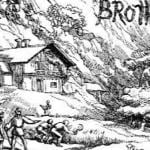 Strange fruit.
Strange fruit.
Billie Holiday.
This is perhaps the most powerful song ever recorded by an American. Written by a Jewish person reacting to lynching and sung by Lady Day;
Southern trees bear strange fruit
Blood on the leaves and blood at the root
Black bodies swinging in the southern breeze
Strange fruit hanging from the poplar treesPastoral scene of the gallant south
The bulging eyes and the twisted mouth
Scent of magnolias, sweet and fresh
Then the sudden smell of burning fleshHere is fruit for the crows to pluck
For the rain to gather, for the wind to suck
For the sun to rot, for the trees to drop
Here is a strange and bitter crop
It is hard to comment on this prophetic song, this jeremiad. African-American men were being lynched all over America. Majority America would accept Billie Holiday singing sensually, but not intellectually. Too many accepted passion, but not intellect. The Cross of Christ showed the Roman that power and truth were not the same.
The Cross of Christ and the Lynching Tree of African Americans had become one in the United States of America.
Professor James Cone says:
To understand what the cross means in America, we need to take a look at the lynching tree in this nation’s history—that “strange and bitter crop” that Billie Holiday would not let us forget. The lynched black victim experienced the same fate as the crucified Christ and thus became the most potent symbol for understanding the true meaning of the salvation achieved through “God on the Cross.”
We rightly understand that the genocide of the Jewish people in Nazi Germany should never be forgotten. Do we forget that our institutional racism, instituted by progressives (Jack London) and conservatives (Senator Bilbo) inspired white supremacy globally?
We are an imperfect Republic.
This is true, but we go on existing, so what to do? Much is good, including the work of Lady Day. How can we preserve what is priceless without excusing what must be condemned?
White supremacy, an idea so pervasive that Woodrow Wilson could embrace it in the White House, trumped truth. Many faithful in American would die for the virgin birth, but then go to the Jim Crow lynching of an African American Christian woman.
Billie Holiday, Lady Day, was so womanly that denying her humanity was impossible without lies. She told the truth in her passion. She had no time for soft focus on sin:
It was best not to say anything as Billie sang “Strange Fruit,” because the song often “made her sick to perform it.” “I have to sing it,” she said, because “Fruit goes a long way in telling how they mistreat Negroes down South.” When Maya Angelou’s twelve-year-old son, Guy, once interrupted her singing to ask, “What’s a pastoral scene, Miss Holiday?” “her face became cruel” and “her voice was scornful.” “It means when the crackers are killing the niggers.” Holiday said with a “thrust of rage,” repelling the boy and stunning her. “It means when they take a little nigger like you and snatch off his nuts and shove them down his goddam throat. That’s what it means.” Billie could be mean because, as jazz critic Ralph Gleason put it, she “was a sort of living lyric to the song ‘Strange Fruit,’ hanging, not on a poplar tree, but on the limbs of life itself.”
For a Christian this is horrifying, but not surprising, since no empire, democracy, or republic, this side of paradise, can be perfect. This is too little: no empire, democracy, republic will not do horrid things.
Lord Jesus Christ, son of God, have mercy on me a sinner.
The Orthodox Christian canonizes the imperfect for what they get right. We do not pretend that even the saints got everything right. The Eastern Roman Empire (called Byzantine) was no utopia. We are people and people are imperfect.
Every day the College at The Saint Constantine School sings that The Mother of God is our Lady. Perhaps the Mother of America is Lady Day singing Strange Fruit.












